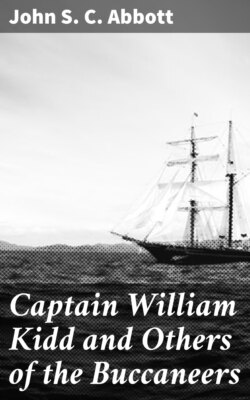Читать книгу Captain William Kidd and Others of the Buccaneers - John S. C. Abbott - Страница 7
CHAPTER III.
Piratic Adventures.
ОглавлениеAudacity of Kidd.—Fate of the November.—Kidd kills William Moore.—The Renowned Ballad.—Kidd’s Compunctions.—Kidd at Madagascar.—Piratic Carousals.—The Artificial Hell.—Kidd’s Return to the West Indies.—Exaggerated Reports of Avery.—His wretched Career, and wretched End.
Captain Kidd, with a piratic frown upon his brow, and piratic oaths upon his lips, turned to Mr. Le Roy and said:
“Do you pretend that this is not a French ship, and that you are but a passenger on board?”
“It is so,” Mr. Le Roy politely replied. “I am a stranger in these parts, and have merely taken passage on board this native ship, under Captain Mitchel, on my way to Bombay.”
“It is a lie,” said the pirate, as he drew from his belt a pistol and cocked it. “This is a French ship, and you are its captain; and it is my lawful prize. If you deny this, you shall instantly die.”
The features of Kidd, and his words blended with oaths, convinced Mr. Le Roy that he was in the hands of a desperate man, who would shrink from no crime. He was silent. Kidd then added:
“I seize this ship as my legitimate prize. It belongs to a French subject, and is sailing under the French flag. I have a commission from his majesty the King of England to seize all such ships in his name.”
It seems strange that Kidd, after the many lawless acts of which he had already been guilty, should have deemed it of any consequence to have recourse to so wretched a quibble. But the incident shows that the New-York merchant, formerly of good reputation, still recoiled from the thought of plunging headlong into a piratic career. By observing these forms he could, in this case, should he ever have occasion to do so, claim the protection of the royal commission authorizing him to capture French ships.
Kidd took his prize, which he called the November, because it was captured in that month, into one of the East-Indian ports, and sold ship and cargo for what they would fetch. What the amount was, or how he divided it, is not known. Again he resumed his cruise. It was evident that he had become anxious to renounce the career of pirate, upon which he had barely entered, and resume that of privateersman. They soon came across a Dutch ship, unmistakably such, in build and flag and rigging. The crew clamored for its capture; Kidd resolutely opposed it. A mutiny arose. A minority of the ship’s company adhered to the captain. The majority declared that they would arm the boats and go and seize her.
The captain, with drawn sabre in his hand, and pistols in his belt, and surrounded by those still faithful to him, stood upon her quarter-deck and said to the mutineers, firmly:
“You may take the boats and go. But those who thus leave this ship will never ascend its sides again.”
One of the men, a gunner by the name of William Moore, was particularly violent and abusive. With threatening gestures he approached the captain, assailing him in the most vituperative terms, saying:
“You are ruining us all. You are keeping us in beggary and starvation. But for your whims we might all be prosperous and rich.”
The captain was by no means a meek man. In his ungovernable passion he seized an iron-bound bucket, which chanced to be lying at his side, and gave the mutineer such a blow as fractured his skull and struck him senseless to the deck. Of the wound the gunner died the next day. Not many will feel disposed to censure Captain Kidd very severely for this act. It was not a premeditated murder. It was perhaps a necessary deed, in quelling a mutiny, in which the mutineers were demanding that the black flag of the pirate should be raised, and which demand the captain was resisting. And yet it is probable that this blow sent Kidd to the gallows. Upon his subsequent trial, but little evidence of piracy could be adduced, and the death of Moore was the prominent charge brought against him.
Kidd ever averred that it was a virtuous act, and that it did not trouble his conscience. It was done to prevent piracy and mutiny. He also averred that he had no intention to kill the man. Had he so intended he would have used pistol or sabre. In the ballad which, half a century ago, was sung in hundreds of farm-houses in New England, the lullaby of infancy, the event is alluded to in the following words:
“I murdered William Moore, as I sailed, as I sailed,
I murdered William Moore as I sailed;
I murdered William Moore, and left him in his gore,
Not many leagues from shore, as I sailed.”
We will give a few more verses to show the general character of this ballad of twenty-five stanzas, once so popular, now forgotten:
